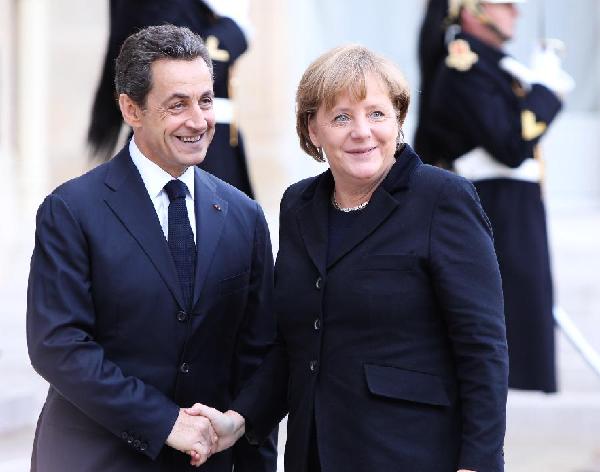Sarkozy, Merkel agree on new EU treaty
 0 Comment(s)
0 Comment(s) Print
Print E-mail
Xinhua, December 6, 2011
E-mail
Xinhua, December 6, 2011
Europe's powerhouses France and Germany agreed Monday on a series of reforms aimed at changing the European Union (EU) treaty to impose tough control of eurozone budgets.
 |
|
French President Nicolas Sarkozy (L) welcomes visiting German Chancellor Angela Merkel at the Elysee Presidential Palace in Paris, France, Dec. 5, 2011. Sarkozy and Merkel met in Paris to thrash out a plan to save the euro. [Xinhua] |
"We want to make sure that the imbalances which led to the situation in the eurozone today cannot happen again," French President Nicolas Sarkozy told a news conference after a meeting with visiting German Chancellor Angela Merkel.
"Therefore we want a new treaty, to make clear to the peoples of Europe, members of Europe and members of the eurozone, that things cannot continue as they are," Sarkozy added.
He noted that the new proposals would include a modified EU treaty, ideally for all 27 EU members, or for 17 eurozone members, with other nations signing on a voluntary basis.
The new treaty would include automatic sanctions for states who fail to observe the 3 percent deficit rule, as well as a budget-balancing rule across the eurozone.
Merkel stressed that the European Court of Justice must be able to verify that national eurozone budgets conform to new anti-deficit rules to be adopted by its members.
With euro's future at stake, both leaders avoided comments on the policy of the European Central Bank (ECB), which has been the main point of dispute between Paris and Berlin.
Facing rising borrowing costs as its 'AAA' credit rating comes under threat, France has urged stronger bond purchases action of the ECB. But Germany opposed the proposal, saying EU rules prohibit such action.
But in move to restore confidence of morose markets and stop months-long financial volatility, Sarkozy changed the tone and stressed that both countries "completely agree" that eurobonds "were not a solution for the crisis."
The two leaders agreed to meet every month until the debt crisis ends.
Franco-German proposals are due to be presented to European Council President Herman Van Rompuy on Wednesday.






Go to Forum >>0 Comment(s)